Biden announces police reform on anniversary of George Floyd's death
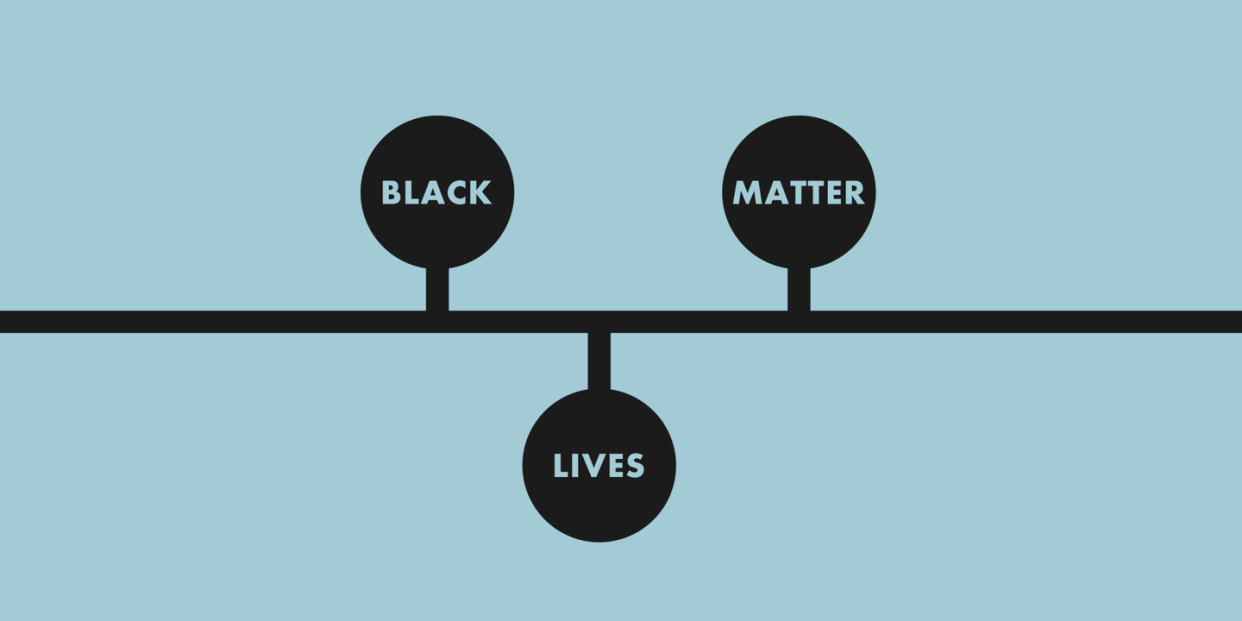
It's been two years since the world was shaken by the death of George Floyd – along with countless other Black people living in the US, including Ahmaud Arbery and Breonna Taylor – catapulting the Black Lives Matter (BLM) movement into the foreground of conversations across the globe.
Black Lives Matter campaigns against violence and systemic racism towards Black people. The international human rights campaign began on social media in 2013 with the #BlackLivesMatter hashtag, and has since gone on to lead calls for Black people to be treated fairly by authorities in the USA and around the world.
According to Black Lives Matter, the movement is "an ideological and political intervention in a world where Black lives are systematically and intentionally targeted for demise. It is an affirmation of Black folks’ humanity, our contributions to this society, and our resilience in the face of deadly oppression." In 2018, five years after Black Lives Matter began, co-founder Alicia Garza said in an interview that BLM's "goal is to build the kind of society where black people can live with dignity and respect."
As we mark two year's since Floyd's tragic death, we take a look back at some of the key moments in the Black Lives Matter movement in the US to learn about how the movement has grown from a social media post to a global network.
2013
The Black Lives Matter movement began in 2013, following the death of Trayvon Martin, an African-American teenager who was shot while walking to a family friend's house, and the subsequent acquittal of George Zimmerman, the man who shot him.
The campaign was co-founded by three Black women: Alicia Garza, Patrisse Cullors, and Opal Tometi, as a response to the police killings of Black people. The phrase "black lives matter" was first used in a Facebook post by Garza after Zimmerman was found not guilty, and was the inspiration for the campaign. Cullors recognised the power of Garza's words and created the hashtag #BlackLivesMatter, and the campaign was born.

2014
The movement quickly gathered pace, with interest and momentum spiking every time a Black person was killed as a result of an altercation with police.
In 2014, Black Lives Matter protested against the deaths of numerous Black and African-American people. In July that year, Eric Garner died in New York City after a policeman put him in a chokehold while arresting him. Then, in August, unarmed teenager Michael Brown was killed by a gunshot from a police officer, Darren Wilson (it was later decided that there was not enough evidence to charge Wilson). Both peaceful protests and riots followed, much of which was done under the banner and hashtag of Black Lives Matter.
In response, co-founder Patrisse Cullors organised the Black Life Matters Ride, which drew a gathering of 600 people and sparked the founding of more localised Black Lives Matter groups and the dissemination of the campaign into a network.
2015
The following year saw another spate of Black people killed by police officers in the USA, including Walter Scott, Freddie Gray, and Meagan Hockaday. Black Lives Matter protested against these and many more. They also organised protests to highlight the injustices faced by Black women and Black transgender women. By the end of 2015, 21 transgender people had been killed that year in the USA, a record number at the time, and 13 of the victims were Black.
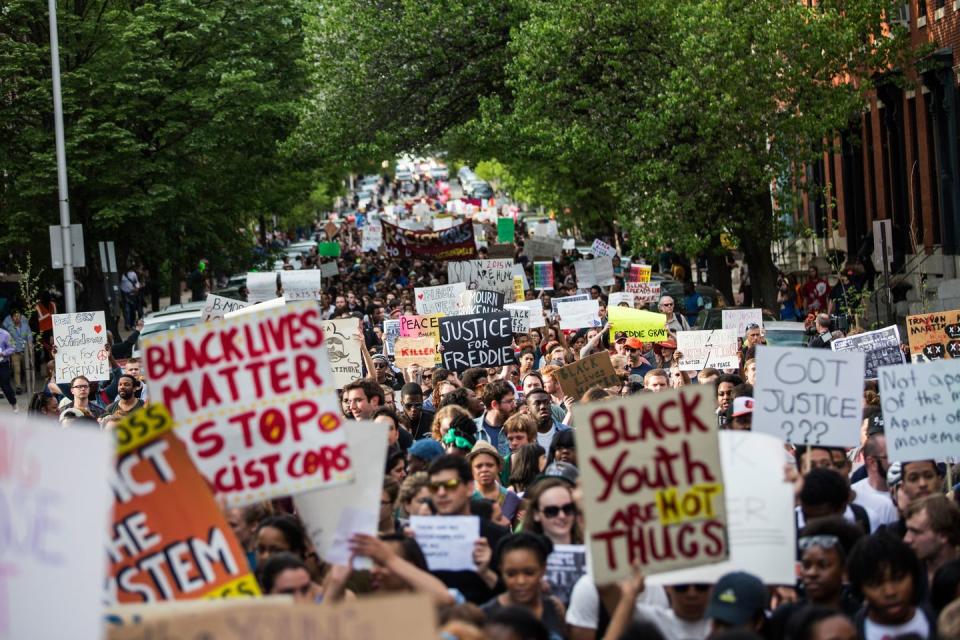
2016
2016 saw Black Lives Matter organise many more protests against police brutality towards Black people. Those whose deaths occurred due to police actions included Deborah Danner and Alton Sterling. Early July saw over 100 protests take place across America following Sterling's death on July 5th, and Philandro Castile's shooting the next day.
This year also saw major American sports stars lend their voices to the cause of Black Lives Matter. In July 2016, basketball players including LeBron James and Carmelo Anthony opened an awards ceremony by speaking about recent deaths of Black people, saying: "Enough is enough." Then, from August, many sports stars began taking part in protests during national anthems at sports games, beginning with Colin Kaepernick, who knelt during the anthem ahead of an NFL game.
2017
Black History Month is celebrated in February in the USA (it's marked in October in the UK). In 2017, Black Lives Matter put on their first art exhibition timed to coincide with Black History Month in the US state of Virginia. It featured the work of over 30 Black artists and creators.
Black Lives Matter protest not only the killings of Black people, but also some acquittals and 'not guilty' verdicts in those cases which make it to trial. In June, they held a protest after the officer accused of killing Philandro Castile the year before was found not guilty.
In August, Black Lives Matter campaigners were among counter-protestors at a white supremacist 'Unite The Right' rally in Charlottesville, Virginia.
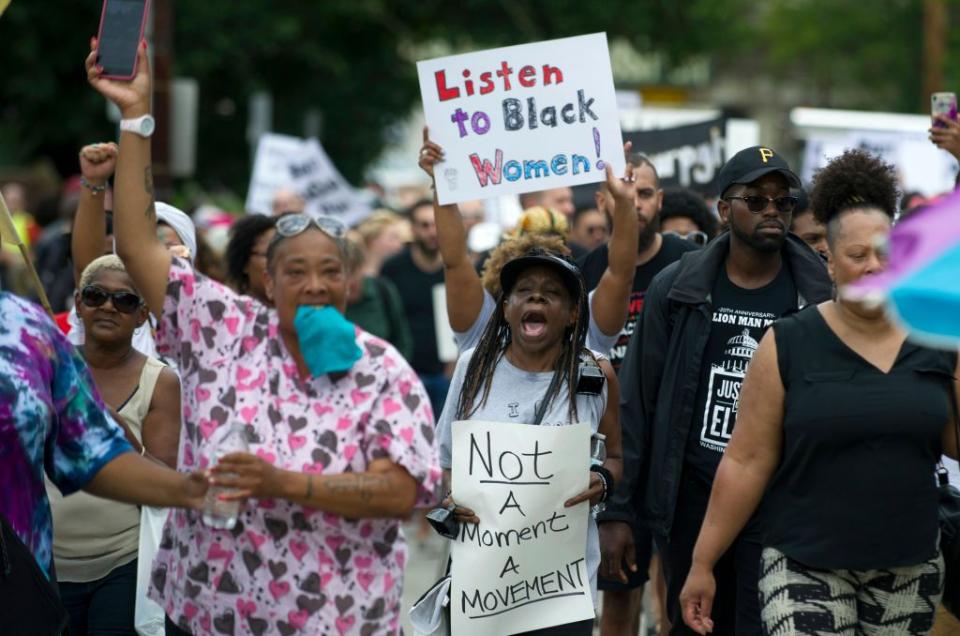
2018
In an interview with ABC News marking five years of Black Lives Matter, Cullors explained the impact the organisation had had on other causes. She said: “[BLM] has popularised civil disobedience and the need to put our bodies on the line... With things like the Women’s March, and Me Too, and March for our Lives, all of these movements, their foundations are in Black Lives Matter.”
By May 1st, 2018, a study found that the hashtag #BlackLivesMatter had been used nearly 30 million times on Twitter since the first instance in 2013.
As they marked five years of action, Black Lives Matter continued to highlight the deaths of Black people who had lost their lives at the hands of US police that year, including Grechario Mack and Kenneth Ross Jr.
2019
In February 2019, the rapper 21 Savage was arrested and detained by the US's immigration agency, ICE. As a result, Cullors convened a group of 60 high profile stars from the music and entertainment worlds to advocate for his release.
Then, in May, Oklahoma teenager Isaiah Lewis was shot by police and killed. Days later, Black Lives Matter held a 100-strong rally in protest.

2020
Major protests were sparked at the end of May following the death of George Floyd in Minneapolis. A video showing a police officer kneeling on Floyd's neck went viral following his death. Police officer, Derek Chauvin, has since been charged with second-degree murder - raised from an initial charge of third-degree murder and second-degree manslaughter (the case is yet to go to trial). Three other officers who were there have all been charged with aiding and abetting second-degree murder and aiding and abetting second-degree manslaughter. Their cases are also yet to go to trial.
Black Lives Matter went on to organise protests around the world. In London, two Black activists Aima, 18, and Tash, 21, organised a rally in Trafalgar Square, which was attended by thousands on Sunday, May 31st.
Many more have followed since. At one London protest, Star Wars actor John Boyega joined 15,000 others in Hyde Park, and told crowds:
"Today is about innocent people who were halfway through their process, we don’t know what George Floyd could have achieved, we don’t know what Sandra Bland could have achieved, but today we’re going to make sure that won’t be an alien thought to our young ones."
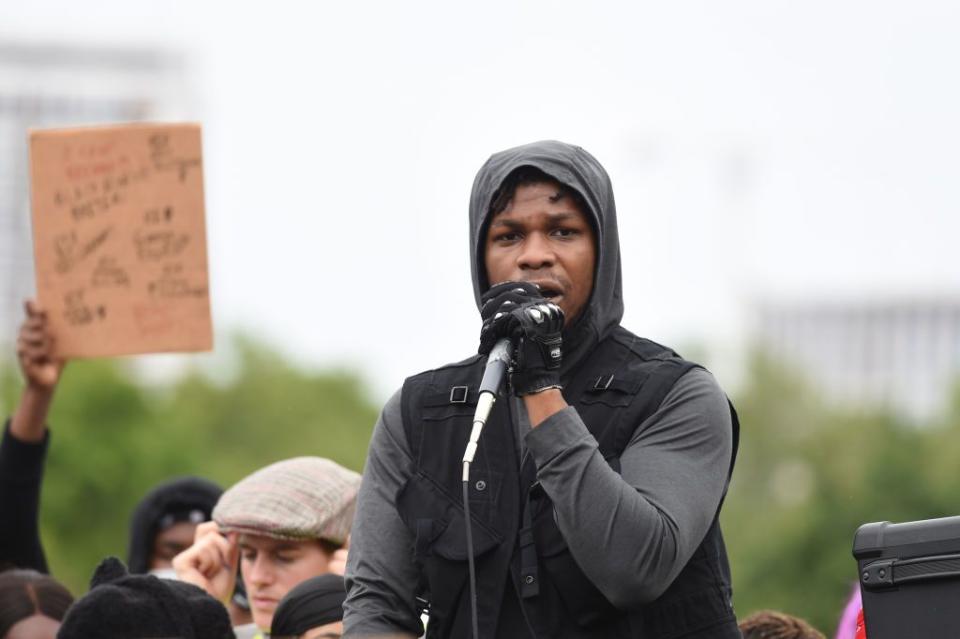
In November, Joe Biden won the US Presidential election, and vote counts revealed that areas with high numbers of Black voters helped him win many of the states that went to Trump in the 2016 election.
2021
In January, the Black Lives Matter movement was nominated for the Nobel Peace Prize by Norwegian MP Petter Eide. His written nomination noted that, “awarding the peace prize to Black Lives Matter, as the strongest global force against racial injustice, will send a powerful message that peace is founded on equality, solidarity and human rights, and that all countries must respect those basic principles.”
On 20 April, former police officer Derek Chauvin was found guilty on all three counts relating to his killing of George Floyd – second- and third-degree murder, and manslaughter. The jury reached the verdict unanimously after 10-and-a-half hours of deliberations.
Crowds who were gathered at the spot where Floyd was killed, outside the courtroom and across the US erupted into cheers as the verdict was read out.
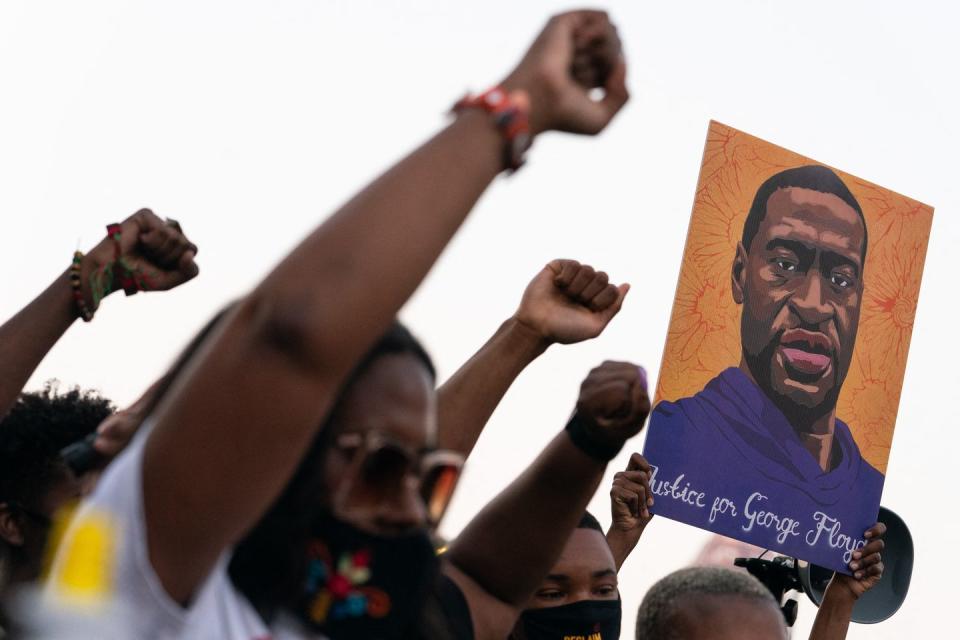
Floyd’s family spoke of their relief and highlighted the work still to be done. “I am going to put up a fight every day,” said George’s brother, Philonise Floyd. “Because I am not just fighting for George anymore.”
Darnella Frazier, the passer-by who recorded the widely shared video of Floyd’s murder when she was 17 years old, said in a Facebook post: “George Floyd we did it!! Justice has been served.”
US President Joe Biden addressed the nation following the verdict, saying it's “a moment of significant change”, but added: “It's not enough. We can’t stop here. We’re going to deliver real change and reform.”
The following month, on 25 May, Floyd's family met Biden at the White House. Meanwhile, people across the US gathered to mark one year since Floyd's death and reflect on the impact this had on the country.
2022
In January 2022, the three men who killed Ahmaud Arbery were sentenced to life in prison – two of whom will not be granted the possibility of parole. At their sentencing hearing, a letter written by Arbery's mother, Wanda Cooper-Jones, was read out to the court: "My family’s going to miss Ahmaud. We’re going to miss his jokes. His impersonations. His warm smile. These men deserve the maximum sentence for their crimes. Ahmaud never said a word to them. He never threatened them. He just wanted to be left alone. They were fully committed to their crimes."
In May, on the eve of the second anniversary of George Floyd's death, US President Joe Biden announced a series of police reforms, with a key focus on revising use-of-force policies.
As part of the order, a national registry of federal and local officers fired for misconduct will be drawn up. On top of that, state and local police will be encouraged to ban chokeholds and neck restrains unless deadly force is required. A restriction on 'no knock' entries has also been limited and will only be permitted when there is an imminent threat of physical violence.
Currently, the order – which asks law enforcement officers to meet or exceed a Justice Department policy that allows force only when no reasonably effective, safe, and feasible alternative exists – covers roughly 100,000 federal law enforcement officials, however Biden aims to expand this to 700,000 officers at the state and local level, with the hope to restore the public's trust in the US police force.
Next month, 1 June marks the start of Black Lives Matter, with those living in the US encouraged to take a stand against racism and racially-motivated violence.
Find out what you can do to demand justice for Black lives here
You Might Also Like


